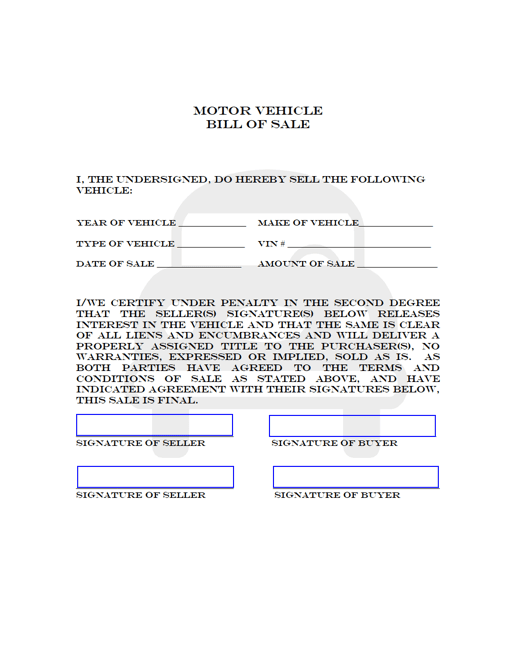Colorado Motor Vehicle Bill of Sale Form
A Colorado motor vehicle bill of sale form includes a synopsis of the dealings between a buyer and seller. The Department of Revenue (DOR) provides an official document for residents to download and/or print. Unlike other bill of sales, the form does not require the buyer and seller to disclose their personal information. Instead, it requires a short description of the automobile and the signatures of all parties involved. If two (2) people co-own (or plan to co-own) the vehicle, both individuals must inscribe to verify the release (or attainment) of ownership.
| Signing Requirements: The buyer and seller must enter their signatures on the designated lines. No notarization required. |
What is a Colorado Vehicle Bill of Sale?
A Colorado car bill of sale symbolizes the agreed-upon arrangement for transferring a vehicle. The buyer and seller must include the primary identifiers of the automobile, such as its year, make, vehicle identification number (VIN), and value. This information helps the DOR (and other law officials) to locate the car and its owner correctly.
What are the Buyer’s Tasks?
Before purchasing a vehicle in Colorado, the purchaser must take additional steps to ascertain a fair deal. Without taking these suggested measures, the buyer runs the risk of obtaining a stolen or totaled car. The following systems reassure the individual of the automobile’s history:
- National Motor Vehicle Title Information System: This database provides the vehicle’s history to check if it has had an accident or experienced significant issues.
- National Insurance Crime Bureau: This portal verifies that the state has not declared the vehicle a total loss (i.e., irreparable, totaled, or priced too high).
- Temporary Permit: The buyer must visit their local motor vehicle office to provide the sale documents, insurance, and photo identification to receive a permit until they can register or title the vehicle in their name.
- Bill of Sale: The buyer must work with the seller to complete the bill of sale, which outlines the vehicle transfer.
What are the Seller’s Tasks?
The seller must also take measures to hand over the vehicle to the buyer successfully. This process holds importance because the previous owner must inform the state of their relinquishment of ownership.
The seller risks responsibility for tickets, accidents, or damages associated with the vehicle if the DMV does not know of the possession change. Therefore, the merchant must take the following steps when selling their car in Colorado:
- Transfer the Title: All owners and co-owners must sign the title, include the date, and print and sign their name(s). It must also provide the odometer reading at the sale if it does not appear on the bill of sale form.
- License Plates: The seller must remove the plates from the car before selling and keep them.
- Bill of Sale: The merchant must complete and sign the bill of sale form with the buyer to verify the transaction.
- Report Transfer of Ownership: Sellers must notify the DMV of the transfer online or in-person using the Report Release of Liability form.
How to Register a Car in Colorado (4 Steps)
Colorado residents who have recently purchased a new or used vehicle have sixty (60) days to register it (§ 42-3-103). Incoming residents have ninety (90) days to apply for car registration. First-time registrars must visit a nearby county office to provide the necessary paperwork.
Step 1 – Emissions Testing
Colorado determines emissions testing by county and model year. Individuals living in Boulder, Broomfield, Denver, Douglas, and Jefferson counties need to undergo inspection. Similarly, residents in designated areas of Adams, Arapahoe, Larimer, and Weld counties must receive emissions testing.
Step 2 – Insurance
All vehicles operated in Colorado need an insurance policy that satisfies the state’s requirements. Individuals without a plan cannot undergo emissions testing, register the vehicle, or perform related tasks.
Step 3 – Submit Registration Paperwork
First-time car registrations must occur in person. Owners can make an appointment up to ninety (90) days in advance by phone or through the online portal. The individual must bring the confirmation letter to the meeting and other required documents and payment.
Bring the Following:
|
Step 4 – Renew Each Year
Colorado vehicle registration lasts for one (1) year and ends on the last day of the expiration month. Law enforcement can stop and ticket drivers with invalid tabs. Therefore, renewing on time prevents citations and penalties. The DOR sends recipients a formal mail notice that alerts them of the upcoming date.
Renewals can occur up to thirty (30) days before expiration. This process can happen online, by phone (720-295-2965), or by mail.
| Mailing Address: |
| Department of Revenue Title and Registration Sections P.O. Box 173350 Denver, CO 80217-3350 |
